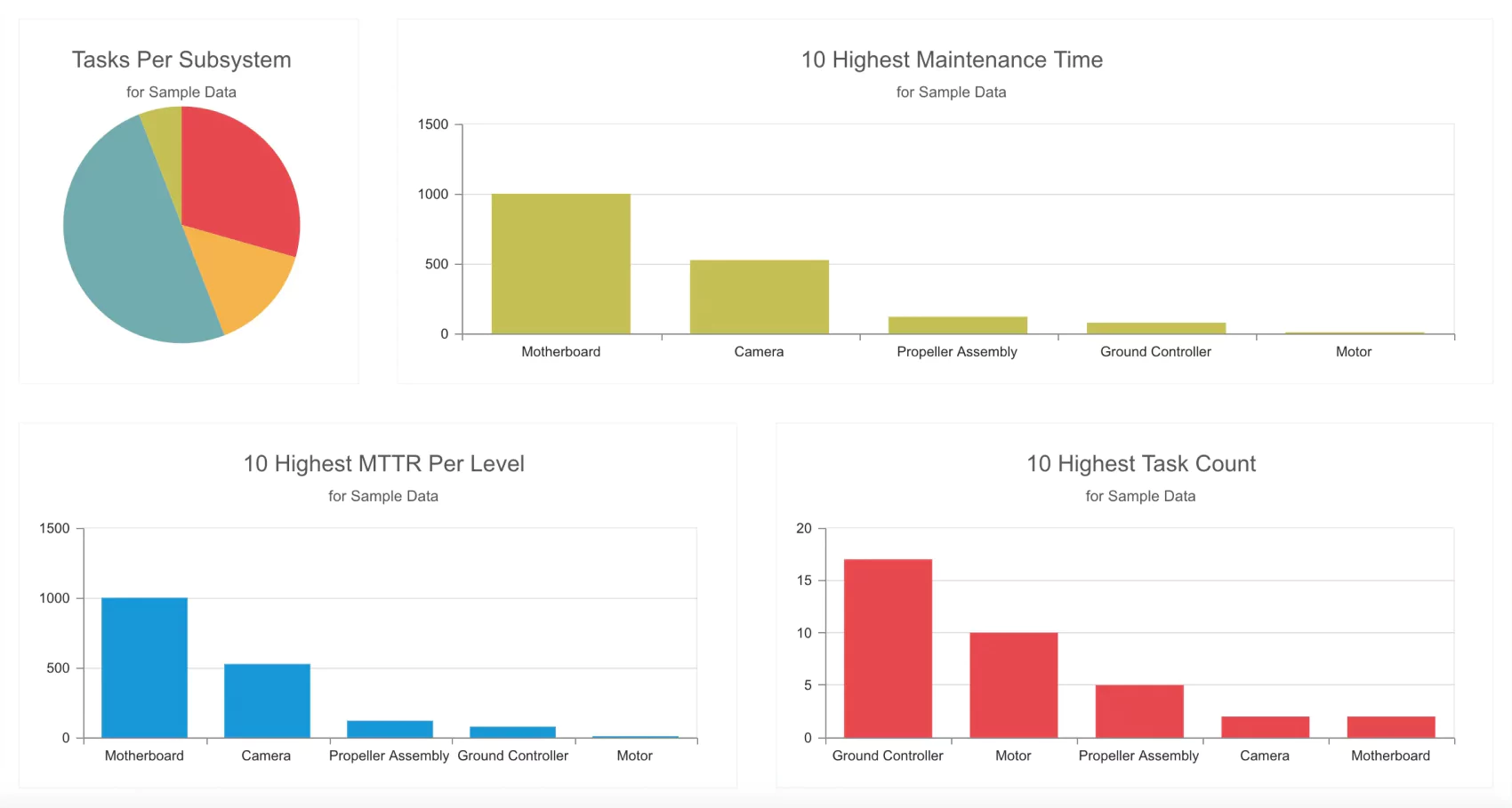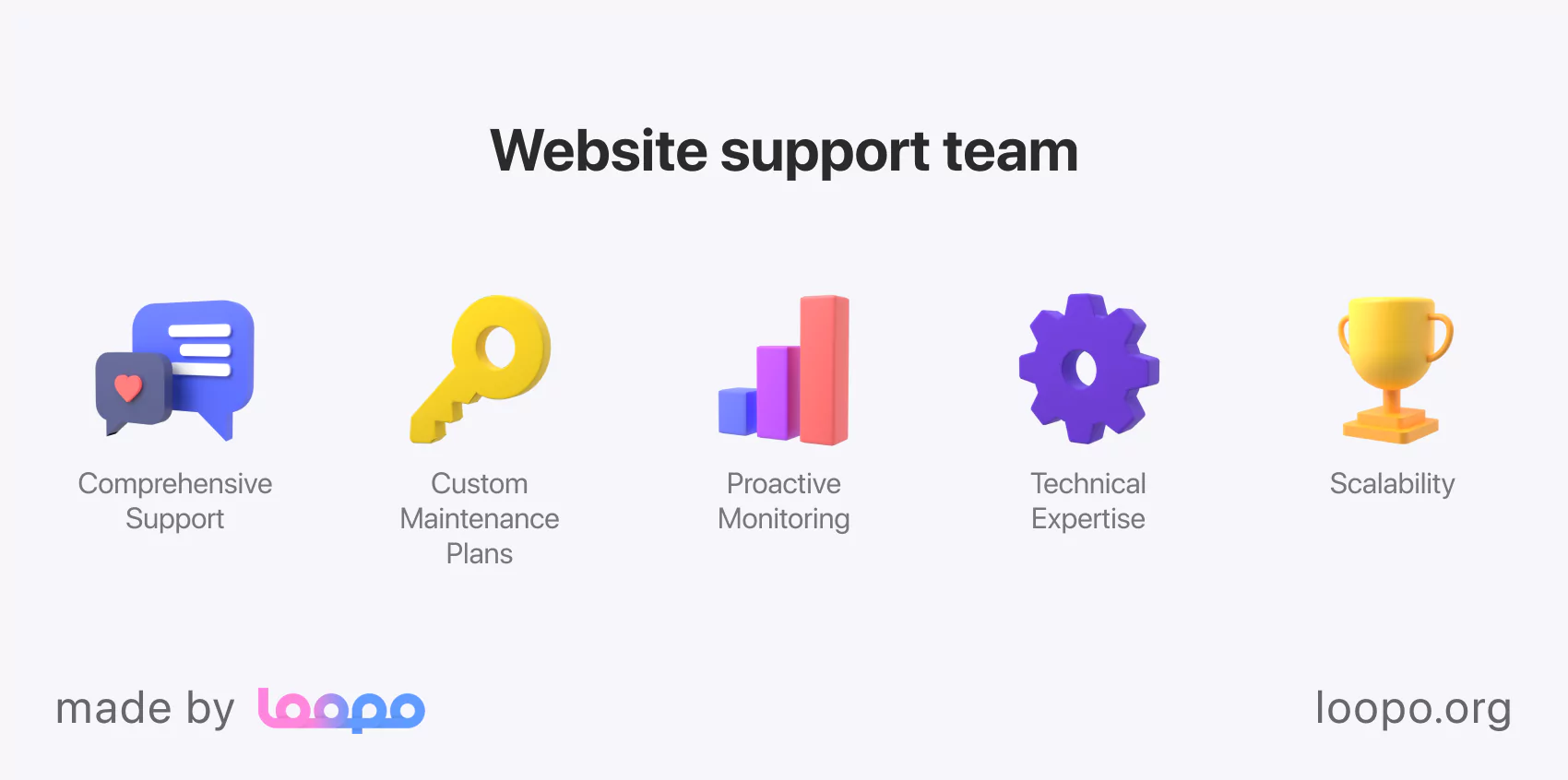Why Website Maintenance Is Essential for Your Business

In today's digital age, your website is often the first point of contact between your business and potential customers. It's not just a virtual storefront; it's a reflection of your brand, a tool for communication, and a platform for transactions. However, having a website isn't enough.
To ensure it remains effective and secure, website maintenance is essential. This comprehensive guide explores why maintaining your website is crucial for your business's success, the key aspects involved, and how to implement an effective maintenance strategy.

Understanding Website Maintenance
What Is Website Maintenance?
Website maintenance refers to the regular updates and tasks performed to ensure your website remains functional, secure, and up-to-date. It encompasses a variety of activities, from fixing broken links and updating content to enhancing security measures and optimizing performance. Essentially, it involves everything required to keep your website running smoothly and efficiently.
Why Is Website Maintenance Important?
Neglecting website maintenance can lead to numerous issues that may negatively impact your business, including:
Security Vulnerabilities: Outdated software can be exploited by hackers, compromising sensitive data.
Poor User Experience: Broken links, slow loading times, and outdated content can frustrate visitors.
SEO Decline: Search engines favor websites that are regularly updated and maintained, affecting your visibility.
Loss of Revenue: Downtime or malfunctioning features can lead to lost sales and diminished customer trust.
The Importance of Website Maintenance for Businesses
Enhancing Security
One of the primary reasons for regular website maintenance is to enhance security. Cyber threats are constantly evolving, and without proper maintenance, your website becomes an easy target for hackers. Regular updates to your website's software, plugins, and security protocols help protect against vulnerabilities and data breaches.

Improving User Experience
A well-maintained website offers a seamless user experience. This includes fast loading times, mobile responsiveness, and intuitive navigation. By regularly updating your site's design and functionality, you ensure that visitors have a positive experience, which can lead to higher engagement and conversion rates.
Boosting SEO Performance
Search engines prioritize websites that are regularly updated and maintained. Website maintenance activities such as updating content, optimizing images, and ensuring mobile compatibility can significantly improve your site's SEO performance. Higher search engine rankings increase your visibility, driving more traffic to your website.
Ensuring Compliance
Web standards and regulations are continually evolving. Regular website maintenance and support help ensure your site complies with the latest legal requirements, such as data protection laws and accessibility standards. Compliance not only protects your business from legal issues but also builds trust with your audience.
Preserving Brand Reputation
Your website is a direct representation of your brand. A well-maintained site reflects professionalism and reliability, while a neglected one can damage your reputation. Regular updates and maintenance demonstrate your commitment to providing quality services and maintaining a trustworthy online presence.
Key Aspects of Website Maintenance
Content Updates
Keeping your website content fresh and relevant is crucial. This involves updating text, images, videos, and other media to reflect the latest information about your products, services, and company news. Fresh content not only engages visitors but also boosts your SEO rankings.
Software and Plugin Updates
Websites often rely on various software and plugins to function correctly. Regularly updating these components ensures compatibility, improves performance, and patches security vulnerabilities. Outdated software can lead to functionality issues and security risks.
Performance Optimization
Optimizing your website's performance involves improving loading speeds, reducing downtime, and ensuring smooth functionality across all devices and browsers. Performance optimization enhances user experience and contributes to better search engine rankings.
Security Monitoring
Continuous security monitoring is essential to protect your website from threats. This includes implementing firewalls, conducting regular security scans, and responding promptly to any detected vulnerabilities or breaches.
Backup and Recovery
Regularly backing up your website ensures that you can quickly recover in case of data loss or a cyber attack. Effective backup and recovery plans minimize downtime and prevent permanent data loss, safeguarding your business continuity.
SEO Maintenance
Ongoing SEO maintenance involves optimizing your website for search engines. This includes keyword research, on-page optimization, link building, and monitoring analytics to adjust strategies as needed. Effective SEO maintenance helps maintain and improve your search engine rankings.
User Experience Enhancements
Continuously improving the user experience involves refining website navigation, enhancing mobile responsiveness, and ensuring accessibility for all users. User experience enhancements lead to higher engagement and conversion rates.
Benefits of Regular Website Maintenance
Increased Security
Regular maintenance web activities significantly reduce the risk of security breaches. By keeping your website's software and plugins updated, you protect your site from potential threats and ensure the safety of your users' data.
Better Performance
A well-maintained website performs better, offering faster loading times and smoother navigation. Improved performance leads to higher user satisfaction and increased likelihood of visitors returning to your site.
Higher SEO Rankings
Consistent website support and maintenance efforts improve your site's SEO, making it more likely to appear at the top of search engine results. Higher rankings drive more organic traffic to your website, increasing your business's visibility.
Enhanced User Experience
Regular updates and optimizations ensure that your website remains user-friendly and engaging. A positive user experience encourages visitors to spend more time on your site and increases the chances of conversion.
Cost-Effectiveness
Preventative maintenance is more cost-effective than dealing with major issues caused by neglect. Regularly maintaining your website helps avoid expensive repairs and downtime, saving your business money in the long run.
Compliance and Trust
Maintaining your website's compliance with legal standards builds trust with your audience. Visitors are more likely to engage with a site that adheres to data protection laws and accessibility standards, enhancing your brand's credibility.
Website Maintenance and Support Services
Comprehensive Support
Website maintenance and support services offer comprehensive solutions to keep your website running smoothly. These services typically include regular updates, security monitoring, performance optimization, and technical support to address any issues promptly.
Custom Maintenance Plans
Different businesses have varying needs when it comes to website maintenance. Many service providers offer tailored maintenance plans that cater to specific requirements, ensuring that your website receives the appropriate level of care and attention.
Proactive Monitoring
Proactive monitoring services detect and address potential issues before they become significant problems. This approach minimizes downtime and ensures that your website remains functional and secure at all times.
Technical Expertise
Professional website maintenance services provide access to technical expertise that may not be available in-house. Skilled technicians can handle complex tasks, implement advanced security measures, and optimize your website's performance effectively.
Scalability
As your business grows, your website maintenance needs may change. Professional maintenance services offer scalable solutions that can adapt to your evolving requirements, ensuring that your website continues to support your business goals.

Website Maintenance for Small Businesses
Cost-Effective Solutions
Small businesses often operate with limited budgets. Small business website maintenance services offer affordable solutions that provide essential support without breaking the bank.
These services ensure that your website remains functional and secure, allowing you to compete effectively in the market.
Focus on Core Business
Outsourcing website maintenance allows small business owners to focus on their core operations. By delegating technical tasks to professionals, you can dedicate more time and resources to growing your business and serving your customers.
Enhanced Professionalism
A well-maintained website enhances your business's professional image. It demonstrates your commitment to quality and reliability, helping to build trust with your audience and differentiate your business from competitors.
Scalability for Growth
As your small business grows, your website needs may evolve. Maintenance of a website services can scale alongside your business, ensuring that your website continues to meet your expanding requirements and support your growth objectives.
Personalized Support
Small businesses benefit from personalized support tailored to their unique needs. Maintenance service providers often offer customized plans and dedicated support to address specific challenges and goals, ensuring that your website effectively supports your business strategy.
Website Design and Maintenance
Integration of Design and Maintenance
Website design and maintenance go hand-in-hand to create a cohesive and effective online presence. A well-designed website attracts visitors, while regular maintenance ensures that the design remains functional and visually appealing over time.
Consistent Branding
Maintaining consistent branding across your website is essential for building recognition and trust. Regular maintenance includes updating design elements, ensuring brand colors and logos are accurately represented, and keeping the overall aesthetic aligned with your brand identity.
Responsive Design
With the increasing use of mobile devices, responsive design is more important than ever. Maintaining a website with a responsive design ensures that your site looks and functions well on all devices, providing a seamless experience for all users.
Content Management
Effective website design incorporates user-friendly content management systems (CMS) that make it easy to update and manage your site's content. Regular maintenance ensures that the CMS remains up-to-date and that content can be added or modified without technical difficulties.
Performance and Aesthetics
Balancing performance and aesthetics is crucial for a successful website. Regular maintenance web efforts optimize both the visual aspects and the technical performance of your site, ensuring that it is both attractive and functional.
Choosing the Right Website Maintenance Service
Assess Your Needs
Before selecting a website maintenance and support service, assess your specific needs. Consider factors such as the complexity of your website, the level of support required, and your budget to find a service that aligns with your business goals.
Evaluate Expertise
Choose a maintenance service provider with proven expertise and experience in handling websites similar to yours. Look for providers who offer a comprehensive range of services, including security, performance optimization, and content updates.
Check Reviews and References
Research potential maintenance service providers by reading reviews and seeking references from other businesses. Positive feedback and testimonials indicate a provider's reliability and quality of service.
Understand the Service Agreement
Carefully review the service agreement to understand what is included in the maintenance plan. Ensure that the provider offers the necessary support, response times, and flexibility to accommodate your business's evolving needs.
Consider Scalability
Select a maintenance service that can scale with your business growth. As your website and business expand, your maintenance needs may change, so choose a provider that can adapt to these changes seamlessly.
Analyze Pricing and Value
While cost is an important factor, prioritize value over price. A slightly more expensive service that offers comprehensive support and expertise can provide better long-term benefits for your website and business.
Provide Communication and Support
Effective communication is crucial for successful website maintenance. Choose a provider that offers responsive customer support and clear communication channels to address any issues or questions promptly.
Implementing an Effective Website Maintenance Strategy
Develop a Maintenance Schedule
Create a regular maintenance schedule that outlines the tasks to be performed and their frequency. This schedule ensures that all aspects of your website are consistently monitored and updated.
Assign Responsibilities
Determine who will be responsible for each maintenance task. Whether handled in-house or by a service provider, clearly assigning responsibilities ensures accountability and efficient execution.
Utilize Maintenance Tools
Leverage tools and software designed for website maintenance to automate tasks such as backups, security scans, and performance monitoring. These tools streamline the maintenance process and enhance efficiency.
Monitor Performance Metrics
Regularly monitor key performance metrics such as website speed, uptime, and user engagement. Analyzing these metrics helps identify areas for improvement and measure the effectiveness of your maintenance efforts.
Stay Updated with Industry Trends
Keep abreast of the latest industry trends and best practices in website maintenance. Staying informed allows you to implement new strategies and technologies that enhance your website's functionality and performance.
Consider Document Maintenance Procedures
Maintain detailed documentation of all maintenance procedures and updates. This documentation serves as a reference for future maintenance tasks and ensures consistency in your maintenance efforts.
Conduct Regular Audits
Perform regular website audits to assess the overall health of your site. Audits help identify potential issues, evaluate the effectiveness of your maintenance strategy, and ensure that your website continues to meet your business objectives.
Common Website Maintenance Tasks
Security Updates
Regularly updating your website's security measures is vital to protect against threats. This includes applying patches, updating firewalls, and monitoring for suspicious activity.
Content Management
Keep your website's content up-to-date by adding new information, removing outdated content, and ensuring all content is accurate and relevant to your audience.
Performance Optimization
Optimize your website's performance by compressing images, minifying code, and leveraging caching techniques to improve loading times and overall user experience.
SEO Enhancements
Continuously improve your website's SEO by updating keywords, optimizing meta tags, and building high-quality backlinks to maintain and improve your search engine rankings.
Broken Link Repair
Regularly check for and repair broken links to ensure a smooth user experience and prevent negative impacts on your SEO performance.
Database Management
Manage and optimize your website's database to ensure efficient data retrieval and storage, reducing the risk of performance issues and data loss.
Backup Management
Implement regular backup procedures to safeguard your website's data. Ensure that backups are stored securely and can be easily restored in case of data loss or corruption.
User Experience Improvements
Enhance the user experience by refining navigation, improving mobile responsiveness, and ensuring that all interactive elements function correctly.
The Role of Technology in Website Maintenance
Automation Tools
Automation tools simplify website maintenance by handling repetitive tasks such as backups, updates, and security scans. These tools increase efficiency and reduce the likelihood of human error.
Content Management Systems (CMS)
A robust CMS facilitates easy content updates and management. Popular CMS platforms like WordPress, Joomla, and Drupal offer extensive features and plugins to support various maintenance tasks.
Analytics and Monitoring
Utilize analytics and monitoring tools to track website performance, user behavior, and security threats. These tools provide valuable insights that inform your maintenance strategy and help you make data-driven decisions.
Cloud Services
Cloud-based solutions offer scalable and reliable hosting environments that enhance website performance and security. Leveraging cloud services ensures that your website can handle traffic spikes and remain accessible even during high-demand periods.
Artificial Intelligence
Artificial intelligence (AI) technologies can enhance website maintenance by automating complex tasks, predicting potential issues, and providing personalized user experiences. AI-driven tools can analyze data and offer insights to improve website functionality and performance.
Best Practices for Maintaining Your Website
Regularly Update Software and Plugins
Keep all software and plugins up-to-date to ensure compatibility and security. Outdated components can lead to vulnerabilities and performance issues.
Perform Routine Backups
Implement a consistent backup schedule to protect your website's data. Store backups in secure locations and test recovery processes regularly to ensure reliability.
Monitor Website Performance
Continuously monitor your website's performance metrics to identify and address any issues promptly. Use tools like Google Analytics and performance monitoring software to track key indicators.
Optimize for Mobile Devices
Ensure that your website is fully responsive and optimized for mobile devices. With the increasing use of smartphones and tablets, a mobile-friendly website is essential for user satisfaction and SEO.
Enhance Website Security
Implement comprehensive security measures, including firewalls, SSL certificates, and regular security audits. Educate your team about best security practices to prevent breaches.
Maintain Clear Navigation
Design intuitive and clear navigation to help users find information easily. A well-structured navigation system improves user experience and reduces bounce rates.
Update Content Regularly
Keep your website's content fresh and relevant by regularly adding new information, updating existing content, and removing outdated material. Fresh content attracts visitors and improves SEO rankings.
Test Functionality
Regularly test all website features and functionalities to ensure they work correctly. Identify and fix any broken links, forms, or interactive elements to maintain a smooth user experience.
Engage with Users
Encourage user engagement through interactive features, feedback forms, and regular communication. Engaged users are more likely to return and recommend your website to others.
Challenges in Website Maintenance and How to Overcome Them
Time Constraints
Balancing website maintenance with other business responsibilities can be challenging. Ongoing website maintenance services can alleviate this burden by handling maintenance tasks, allowing you to focus on core business activities.
Technical Expertise
Not all businesses have the technical expertise required for effective website maintenance. Partnering with professional maintenance services provides access to skilled technicians who can manage complex tasks efficiently.
Budget Limitations
Allocating sufficient budget for website maintenance can be difficult, especially for small businesses. Opt for cost-effective maintenance plans that offer essential services within your budget constraints.
Website Trends
Staying updated with the latest website trends and technologies requires continuous learning. Engage in regular training, subscribe to industry publications, and collaborate with experts to stay informed.
Multiple Platforms
Managing websites across multiple platforms can be overwhelming. Use centralized management tools and standardize maintenance processes to streamline the management of multiple sites.
Consistency
Maintaining consistency in design, content, and performance across your website is essential but can be challenging. Develop standardized procedures and guidelines to ensure uniformity in all maintenance efforts.
Future Trends in Website Maintenance
Increased Automation
Automation will play a larger role in website maintenance, handling repetitive tasks and improving efficiency. Automated tools will continue to evolve, offering more advanced features and integrations.
Enhanced Security Measures
As cyber threats become more sophisticated, website maintenance will focus more on advanced security measures. This includes AI-driven security solutions, biometric authentication, and proactive threat detection systems.
Personalization
Personalized website experiences will become more prevalent, driven by data analytics and AI. Maintenance strategies will need to incorporate personalization techniques to enhance user engagement and satisfaction.
Integration of AI and Machine Learning
AI and machine learning will revolutionize website maintenance by providing predictive analytics, automated troubleshooting, and intelligent content management. These technologies will enable more proactive and efficient maintenance practices.
Sustainability and Green Hosting
Environmental sustainability will influence website maintenance practices, with a focus on energy-efficient hosting solutions and green technologies. Businesses will prioritize eco-friendly practices as part of their maintenance strategies.
Voice Search Optimization
With the rise of voice-activated devices, maintaining a website optimized for voice search will become essential. This involves adjusting content and SEO strategies to cater to voice search queries and user behavior.
Enhanced User Privacy
User privacy concerns will drive website maintenance practices to incorporate more robust data protection measures. Compliance with privacy regulations and transparent data handling practices will be paramount.
Conclusion
Website maintenance is not just a technical necessity; it's a strategic imperative for businesses aiming to thrive in the digital landscape. Regular maintenance ensures that your website remains secure, performs optimally, and provides an exceptional user experience. It enhances your SEO efforts, maintains compliance with evolving regulations, and preserves your brand's reputation.
Whether you're a small business or a large enterprise, investing in ongoing website maintenance and support can yield significant returns by increasing security, improving performance, and driving business growth. Don't let your website become a liability—prioritize its maintenance to ensure it continues to serve as a powerful asset for your business.
Please discover valuable insights on our blog and connect with us for customized solutions.




